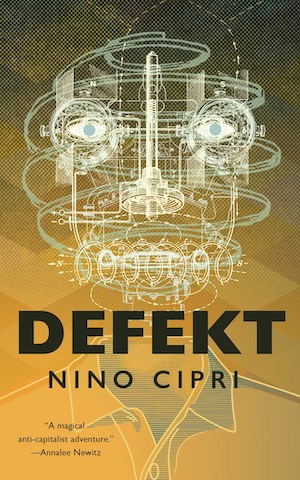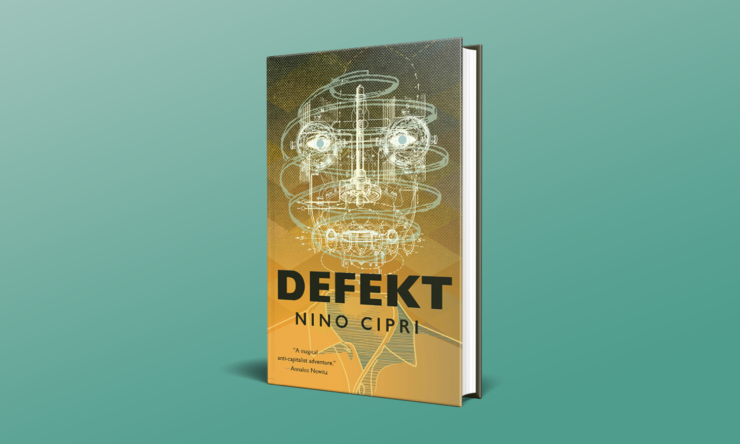Defekt is Nino Cipri’s second novella set in the world(s) of LitenVärld, a fictionalized IKEA, following Finna (2020) but perfectly readable as a stand-alone. While Jules does pop up in the background at the start of the book, our protagonist for this frightful multidimensional excursion is Derek: an employee whose loyalty to the LitenVärld family is unparalleled, whose living space is a shipping container at the backlot of the store and who’s never taken a sick day… until he starts coughing blood unexpectedly.
But the perfect employee shouldn’t need time off. Calling out sick leads Derek to be assigned to a special inventory team for a locked-in night of hunting defective products, like toy chests that have grown pincers and eyestalks, but that’s not even the strangest part. The honor of peak weirdness goes to the visiting inventory team, a set of four strangers who look and sound (almost) identical to him.
So, when it comes to facing down sentient furniture horrors, are five Dereks really better than one? Or are the furnishings come to life not the real problem?
Defekt is a spookily entertaining tale that carries a number of compelling themes right under the surface. I’m not surprised that the novella is pulling double-duty, either; I come into Cipri’s work keen-eyed for thoughtful implications woven deftly throughout the narrative. The LitenVärld stories are wonderfully queer anti-capitalist sf, but that’s just one part of what’s going on in them—the one folks tend to notice first. For example, in Finna, the emotional core of the book is a pair of people building a friendship out of the remains of a romantic break-up during an unnerving adventure.
Buy the Book


Defekt
Defekt, though, picks up the fear-factor and runs with it. The novella opens with a selection from the “Special Exempt Employee” handbook, which features phrases like “When ‘Don’t Be Evil’ Fails, Try ‘Don’t Be Boring’” and “WE ASSERT ORDER IN A CHAOTIC UNIVERSE,” delivered in the hyper-positivist second person of retail manuals. Once Derek is locked into the store for his special inventory night, we also get hair-raising scenes such as him being hunted by a camouflaged luxury toilet that has ripped itself out of the wall, flooded the storeroom, and begun stalking him through the emergency-red-lit glow of the moveable faux-IKEA maze.
Seriously, Cipri has a real talent for prose that gives you goosebumps.
(Spoilers follow).
However, after Derek is rescued by the visiting clone-team and we settle in to what appears to be a plot about cataloguing and surviving monstrous appliances… the reader witnesses the gruesome murder of a table-creature by Dirk, alongside Derek’s mounting terror at realizing what “special inventory” means. The initial Alien-esque vibe abruptly twists in place when it’s revealed that LitenVärld, to cut costs, has decided not to catalogue the defective/evolving merchandise but to kill it. Dirk is a sociopath, Derek is one of the defectives himself, and the monsters we thought were a threat are actually just acting out of self-preservation. Reversals! From then on, Defekt becomes a book about staging a coup against LitenVärld’s nightmare system of multiverse capital exploitation.
Queer horror—and, yeah, also horror of queerness—often centers on the monstrous body: having the wrong parts, the permeability of bodies that shouldn’t be penetrated, the opening up of orifices, unpredictable fluids. Derek’s awakening resistance to being used as a disposable tool, a cog in a bad machine, arrives in the form of an extra bleeding ruptured mouth slashed across his throat that speaks with empathic resonance when he’s trying to crush himself into a lie. His throat-mouth is what marks him as defective, unfit for the system he’s attempting to maintain his role in. (And what a haunting sensory description of the painful, bulging, cracking thing inside his neck!)
So in the first portion of the novella, before the perspective flip, the horror of this painful orifice pulses off the page… but after, that source of horror becomes a source of desire. His first sensual encounter with Darkness occurs when they ask to see and touch his throat. Though he worries that it’s disgusting, scared to even look at it himself, their response is: “It’s kinda hot, not gonna lie.” The horror of his hidden truth shifts into tender approval. When he later runs into his alternate universe self and sees his supposed defect on another person’s body, it offers him a secondary comfort. If I’m being a little poetic about it, the awfulness of ‘being defective’ within the scope of the bad system transmutes to good feelings when Derek decides fuck the bad system.
On that note, I’m totally delighted that the question of “would you fuck your clone?” serves a purpose in Defekt. The four clones, and Derek’s responses to them, offer a glimpse of what we want and need from other people and our social systems. I appreciate that Cipri deals with how attractive Dirk is at first to Derek: he’s confident, his praise feels like warm sunshine, he takes no shit, he’s butch and in control. The problem is, he turns out to be an absolute asshole whose grandest desire is to do violence and exert power for power’s sake. Acknowledging the honesty of that want makes the narrative shift stronger when Derek chooses to fight against Dirk instead of remaining loyal to the system.
When Derek sides with the three clones who’ve been suffering under Dirk and cements his psychic connection to the living furnishings, he chooses to form a coalition across wildly differing types of creatures. His desire for Darkness, the first time he’s felt his body as wanted and wanting rather than a tool, allows him to blossom into an empathetic understanding of others too. It’s so much fun that the sf trope of clone-fucking (implicit or otherwise) drives the narrative alongside the friendships Derek forms with the other “defectives.”
Because the relationships that are central to the LitenVärld novellas are one answer to the question of, “what do we do about late capitalism’s descent into world-devouring immensity?” People form collectives; those collectives—unions, kinship webs, communities—resist the (truly cosmic, here!) horror of global capital. While hunting and being hunted, Derek realizes that continuing to mold himself into the broken system will destroy him, as well as creatures and people as or more vulnerable than he is. Defekt carries an implicit message, there: queerness isn’t a guarantee of resistance… but it can serve as a spark to non-conformity, a place where connection can kick-start or nurture coalitions.
And, to close on a less broad note, props again to Cipri for giving me the biggest creeps with the special exempt employee handbook inserts. The constant eerie shivers those provoked brought me a deep and personal glee. I’m hard to spook, but that—and the carnivorous toilet scene—sure managed. Defekt is a smart novella with a ton of underlying implications that are worth teasing out, but at the same time, it’s super fun to read for the high-tension plot and unsettling, reality-warping hijinks. Certainly a solid companion to Finna, both thematically and narratively.
Defekt is available from Tordotcom Publishing.
Read an excerpt here.
Lee Mandelo is a writer, critic, and editor whose primary fields of interest are speculative fiction and queer literature, especially when the two coincide. They have two books out, Beyond Binary: Genderqueer and Sexually Fluid Speculative Fiction and We Wuz Pushed: On Joanna Russ and Radical Truth-telling, and in the past have edited for publications like Strange Horizons Magazine. Other work has been featured in magazines such as Stone Telling, Clarkesworld, Apex, and Ideomancer.











I’m number three on the hold list. I’ll have to patiently wait my turn.
Huh. So between this and Grady Hendrix’s Horrorstör, is “Ikea Horror,” a burgeoning subgenre?
@2: There is also ‘In the Ballroom’, a short story by Joe Hill